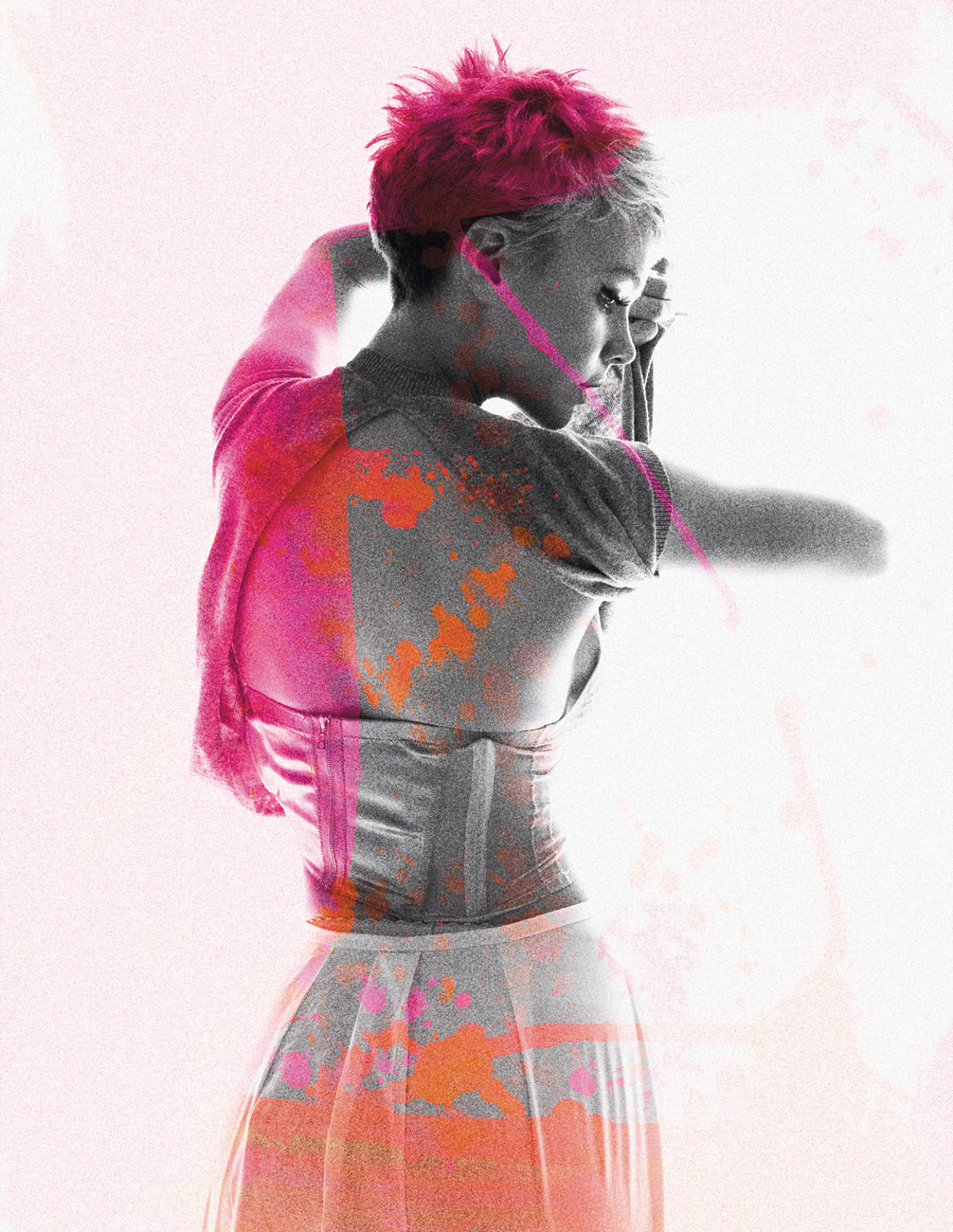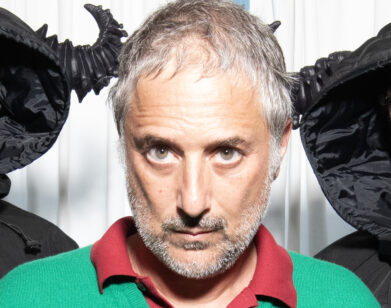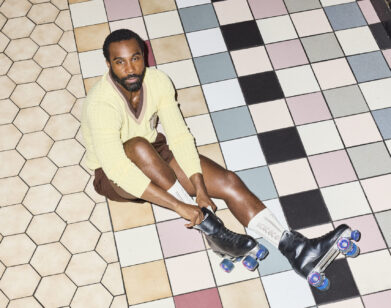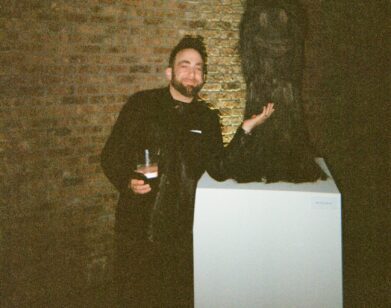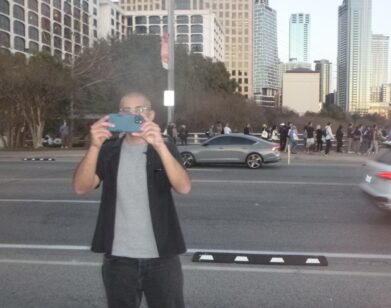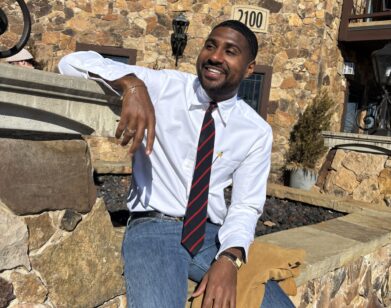Carey Mulligan
Since her star-making performance in director Lone Scherfig’s An Education last fall, Carey Mulligan’s meteoric rise has itself become a cinematic affair—a quick-cutting whirlwind of awards shows, paparazzi, short hair, and self-effacing British charm. The 24-year-old Mulligan’s portrayal of a precocious but naïve schoolgirl whose hunger for experience leads her to become romantically involved with an older man (played brilliantly by Peter Sarsgaard) earned her an Oscar nomination. But Mulligan’s impressive work in An Education isn’t the only reason why many are finding great solace in her emergence as one of the most important young actresses working today. It’s what her success represents: the triumph of talent, acelebration of difference, and a small victory for a young woman who sounds believable when she says she’s in it for the roles and not the acclaim. “Carey stood out immediately,” Scherfig says. “Not because she reminded me of anyone—more perhaps because she didn’t.” “She has this great indefinable quality,” says Jim Sheridan, who directed Mulligan in his most recent film, Brothers. “Yet you feel like you immediately know who she is.” “In the British tradition, she holds a lot more in than an American actress,” offers Oliver Stone, who cast Mulligan as Winnie Gekko, the estranged daughter of Michael Douglas’s Gordon Gekko, in Wall Street: Money Never Sleeps, due out in September. “There’s a British reticence to Carey, a kind of apartness that, in my mind, characterizes Winnie Gekko, who has been alienated by life, family, the betrayal of her father, the death of her older brother, and the madness of her mother,” says Stone. “She wasn’t supposed to be typically American in her reactions to her environment. To the contrary—she was supposed to be rather terrified at the prospect of family.”
Mulligan has been acting since she was six years old. In her first role, she played a boy in a school production of The King and I, which she followed up with a series of male parts when she went off to attend an all-girls’ boarding school. She got her professional start at 19, after approaching actor and screenwriter Julian Fellowes, who had given a talk at her high school. Fellowes put Mulligan in touch with a casting agent who was working on Joe Wright’s 2005 adaptation of Pride & Prejudice starring Keira Knightley; Wright wound up casting Mulligan in the film, in which she played the Bennet sister Kitty to Knightley’s Elizabeth.
Since then, Mulligan—who, incidentally, applied to and was rejected by several prestigious drama schools following the completion of her A-level exams—has had the good fortune to be able to immerse herself in nonstop work: appearing in a number of British television programs, including an adaptation of Charles Dickens’s Bleak House (2005); doing stage work, including a part in a 2008 Ian Rickson Broadway production of Anton Chekhov’s The Seagull alongside Kristin Scott Thomas, Zoe Kazan, and her An Education co-star Sarsgaard; and playing a hooker in Michael Mann’s Public Enemies. Scherfig cast Mulligan in An Education based on a lo-fi screen test. “Her small, out-of-focus DVD test stayed with me,” says Scherfig. “Her easy access to a wide range of emotions and her pitch were both extraordinary.”
In addition to Wall Street: Money Never Sleeps—which co-stars Mulligan’s real-life love interest, Shia LaBeouf—Mulligan also appears this month in first-time feature director Shana Feste’s The Greatest, and recently reteamed with Knightley for Never Let Me Go, Mark Romanek’s new adaptation of the Kazuo Ishiguro book of the same name. Susan Sarandon, who worked with Mulligan on both Wall Street: Money Never Sleeps and The Greatest, recently spoke to her by phone from New York while Mulligan was in London.
I think I model my life on Home Alone. I want to have crazy fun and get into scrapes. .Carey Mulligan
SUSAN SARANDON: The last time I did one of these, I interviewed Jake Gyllenhaal. We met at a restaurant, and it was too noisy, so we ended up talking on the floor in the ladies room. . . . So at least you’re comfy and dry—and there won’t be toilets flushing during our interview. [both laugh] So, to begin, I looked up the year you were born and, according to Chinese astrology, it was the year of the ox.
CAREY MULLIGAN: What does that mean?
SARANDON: It means that you like to tend the home fires. You’re reserved. You stick to the rules. You’re somewhat introverted. It’s very auspicious for a Gemini like you to be born in an ox year. It means you’re very witty, methodical, a loner, a leader, proud, precise, original, self-sacrificing, strong, tenacious, patient, hardworking, familial. Does any of that sound true?
MULLIGAN: Reserved. . . . Am I reserved? I think I agree with that. I don’t think I’m particularly original. I am quite homey, though. But then I’m also quite transient. I quite like being nomadic.
SARANDON: But you make a home wherever you land, right?
MULLIGAN: Yeah, that’s true. I mean, the minute I get into a hotel room, I scatter my stuff everywhere. It’s like a bomb site within a minute. So I suppose that means I’m trying to nest.
SARANDON: Find your territory and make it yours. Have you enjoyed being in New York City?
MULLIGAN: I love New York. I think I could live in New York. The first time I was there for an extended period of time was a couple of years ago when we shot The Greatest, and then I did the play The Seagull the following summer. I came back last fall to do Wall Street. But I love New York—maybe more than Los Angeles or London. I think I’m happiest in New York.
SARANDON: Well, New York is very user-friendly if you don’t want to be in a car all the time. It can also provide you with surprises because it’s so compressed—if you walk around, you just find things.
MULLIGAN: You can spend an entire day walking around in New York, whereas in L.A., it always ends at some point because you have to find a way to get home.
SARANDON: Or you get mistaken for a hooker. [both laugh] In L.A., you have to know how to walk.
MULLIGAN: You really do! If you’re walking down the street in L.A., people do sort of look at you like you’re a hooker because it’s so rare to see someone just walking.
SARANDON: Did anything surprise you about living in New York? Did you have a preconceived notion about it that was shattered?
MULLIGAN: Yeah. I think people turned out to be nicer than I thought they’d be. In London, people can be so . . . well, it’s not even a case of people being unkind or unfriendly. You just don’t make any contact in London. You go from A to B with your eyes on the pavement. I think New York is more social, and I didn’t expect that. I kind of had an idea that New York would be like Fashion Week, where everyone always looks incredibly chic and cool, and I wouldn’t fit in. But when I was doing The Seagull, Zoe [Kazan] and her group of friends opened up to me so quickly. When you and I did The Greatest together, after three days I was in your family home, meeting your kids. People in New York just seem a lot more open than I thought they would be.
SARANDON: As a high-profile couple, do you find that it’s easier for you and Shia to be in New York or in L.A.? You seem to have been able to kind of be under the radar, which is an accomplishment.
MULLIGAN: I don’t really talk about it, but I think it’s probably easier in New York. In L.A., it’s a little bit harder—especially if you don’t drive, because you’re just more exposed. I didn’t know how to drive until recently, but I just passed my driving test!
SARANDON: Congratulations!
MULLIGAN: Thanks. Basically, every time I wasn’t doing press for An Education, I was taking a driving lesson, so I just got my license. I drove around for about two weeks before I came home to London for the BAFTAs, but I can drive now, which makes everything easier.
SARANDON: Do you take the freeway? Or do you just stick to the side streets?
MULLIGAN: I mainly take the side streets. I’ve only taken the freeway once or twice, but it was during rush hour, so no one was going superfast. I don’t go very many places. Actually, the day I passed my driving test, I had to go to a meeting in Toluca Lake, so I was driving over there, and I was followed! This was the first time I was in my car on my own, and these three paparazzi guys were following me in their cars. I was like, “Are you kidding me? This is great. The day I get my license, I’ll have this horrific accident.” But the most ridiculous part was that I was trying to do some evasive driving to lose them—I mean, I can barely park, and I was trying to change lanes and things. My GPS woman was also not doing me any favors, so I was driving into cul-de-sacs and making U-turns—I had no idea what the fuck I was doing. I was really stressed. Eventually I pulled over, and the three cars stopped behind me. I was sitting there, trying not to cry, trying to call a friend for help, when this guy—like, the leader of the pack—came up to my car and gestured for me to roll down my window. So I rolled it down, and he said, “We know where you’re going. We can’t take pictures of you there. But do you want us to show you how to get there?” I didn’t want to accept his help because I was so angry, but I was also lost, so I had no choice. He said, “Okay, I’ll show you where it is, and then we’ll leave you alone. Just follow me.” So I followed him, and the place I was looking for was two minutes away, blindingly obvious. And then he left me alone and drove away! The next day, I went shopping with my friends, and I forgot I had a car at the meter, and the same guy paid the parking meter for me! So it’s just funny—and weird. Driving has opened up a whole new world for me.
SARANDON: Maybe they were angels who were just there to show you the way.
MULLIGAN: Yeah. They weren’t really nasty men.
SARANDON: Which do you prefer, theater or film? Why?
MULLIGAN: I’ve always said I prefer theater, but there’s only ever been one play that I really loved doing, and that was The Seagull. I have rose-tinted ideas about the theater, but in the other two plays I did in London in the years before that, I felt like I was miscast. I felt completely out of my depth. There was something about The Seagull, though, that I thought I understood, which made it just heaven. It’s interesting, because with film, I get horribly nervous doing even a small part. I get really conscious of the fact that I’m acting, because of the cameras.
SARANDON: In the theater, you’re so much more in charge as an actor. For better or for worse, you know what the audience is seeing. But you can be acting your socks off on film, and then you see the movie, and the camera is on the other actor, or they’ve cut out the lines you thought were significant, or they’ve adjusted the plot. So much of it is out of your control.
If you’re walking down the street in L.A., people do sort of look at you like you’re a hooker because it’s so rare to see someone just walking. Carey Mulligan
MULLIGAN: One of the things I love about the theater is that no one can tell you to stop. Once you’re onstage, it’s three hours, and whether you’re completely off or you’re just horrendous, you’ve got to find a way to leave an impression. There’s not that terrible thing that you get when you’re making a movie, where you get in your car at the end of the day knowing that something you’re not proud of was immortalized on film, and you can’t fix it because they won’t reshoot it. And, you know, you can come back and watch what you did and realize it was completely fine and you just built it up in your head, but otherwise that moment is on film forever and ever. Although I do remember when Kate Winslet and Sam Mendes came to see The Seagull. I didn’t know that they were there until afterwards, but it was one of those nights where I just couldn’t get myself into the play, where I get offstage and get into a taxi to go home and am like, “That was horrible.” But afterwards, I was taking off my costume, and someone said, “Oh my god—Kate Winslet was here!” I just burst into tears. Everyone was going to meet her because half the crew knew her—and everyone knew Sam. But I went out the stage door and got a taxi. I didn’t want to have to meet them because then they’d have to go, “Congratulations!” even though I was crap. It was just the worst feeling, like, “They’ll never see that show again. They’ll always think that was my performance in that play, and that’s just awful.”
SARANDON: Have you landed on a kind of technique that works for you yet? What do you need to do for yourself in order to feel like you’re really in that place where you’re focused and free as you’re performing?
MULLIGAN: I don’t know. I feel like I have more of a hold over it than I did before. From Pride & Prejudice onwards—because Pride & Prejudice was basically my first professional job—whenever I had to do something emotional, I just imagined that it was all linked back to me. And so I imagined terrible things happening to my family, and funerals, and all of these awful things. Then I got onto The Seagull, and my character’s life was so far removed from my own that the idea of doing it every night and having it all be linked to my life was just too much. It was craziness—and kind of impossible to be truthful, because I’ve had quite a sheltered life. And I’m kind of happy, and—touch wood—nothing really awful has happened to me. But I don’t like the idea of having to mess yourself up to be a good actor.
SARANDON: You mean, if you’re playing a drug addict, you won’t go be a drug addict—that whole school of thought.
MULLIGAN: I don’t know. I’ve never done coke or anything, and I’ve never played a character who has, so I don’t know whether I would actually try coke if I had to play a character who took coke. It’s never come up before. But I do feel like whatever happened on The Seagull, working with that director, I found a way of making up a completely different person and creating a bunch of images and words and memories, so that it became a really full world that had nothing to do with me—and I believed in it very strongly. But it’s different on film. I feel like there’s a switch in your head that you’re required to turn on and off more often when you’re making a movie. I haven’t done this long enough to identify what it is, but I do find it easier to turn the switch on in theater than in film.
SARANDON: If you’re offered a film, what’s your top priority? Very rarely do you get the director, the script, the cast you want. How do you decide? Because now you’re going to be offered so many short-haired girls.
MULLIGAN: I know, I know. Wigs this year—I’m so done with short hair. It’s driving me crazy. But I get really excited when I hear about the other actors who are going to be in the film. I think that if you’re paired with really strong actors, then you’ll be better yourself. And even if it doesn’t work out with the director, then maybe the strength of the performances or whatever you’ve built with each other can sometimes survive.
SARANDON: Do you have a strategy for how you pick films?
MULLIGAN: Not really. I feel that people have been saying, “Do you feel pressure now for your next role?” And I’m like, “Well, the next three things that anyone is going to see me in were choices I made almost two years ago.” Never Let Me Go was a year ago. The Greatest was a year and a half ago. Wall Street 2 was last year. These decisions were all made before I knew what was going to happen with An Education. I don’t think I want to play title roles. I don’t want to be the face on the poster. I don’t want that pressure of having the success riding on my shoulders. I just want to play the most interesting parts. I actually think it’s incredibly rare to get an interesting female character that is the lead in a film. Usually the character parts are so much more interesting to play.
SARANDON: An Education must have just flipped you out then. MULLIGAN: That’s the thing—parts like that are such a rarity. Since An Education came out, I’ve read so many scripts about short-haired girls who wear Ramones T-shirts who have a kind of quirk factor. But I think it’s all about the characters. Luckily, I’m not restricted when it comes to age. I can play a bit younger, like I did in An Education, but I can also play older, like I did in Never Let Me Go, where my character is 28 by the end of the film. I also don’t look specific—I can change my appearance quite easily just by changing my hair. So I can adapt quite well.
SARANDON: Were you surprised at all that An Education has done as well as it has?
MULLIGAN: We had no idea that any of this was going to happen. I thought An Education would be in a couple of art-house cinemas in London. It felt so small to us. I mean, it still hasn’t made a huge amount of money, but none of us expected any of the awards stuff—or maybe the others did, but I had no idea. I also never felt like I was the lead in it. Everyone was saying, “What was it like to play your first lead role?” But I don’t remember ever being like, “Oh, this is scary.” I read it for what it was: an ensemble. I was never really alone.
SARANDON: The thing that I loved about it was that it could have been done in such a clichéd way, but because Peter [Sarsgaard] was so sympathetic and because you were so strong and smart, I didn’t feel the age difference between the characters, which would have been repulsive. It also didn’t seem like it was all about sex. It seemed like your character was really hungry for glimpses into these worlds that she hadn’t been exposed to, and here was this guy who was so insecure that he really was most comfortable being that kind of figure for this young girl. People always want a young girl to be a victim, but your character wasn’t a victim. I mean, she was lied to, but I felt like she came out on top.
MULLIGAN: I don’t think Peter got half enough credit for what he did in that movie. I don’t know how many people would have been able to pull off that character the way he did, because it really could have gone completely the other way. It was such a fine line. I think he always had in his mind that this character was a guy who—quite justifiably, because he would have been growing up during the war—missed out on his childhood, and so he wanted to be around a 16-year-old to feel like he was living through her. But Peter was very careful about making sure that she drove the romance. My character leans in for the first kiss; she puts her hand on his back in Paris. The director, Lone, was always trying to put in these small touches to show that my character was the one who was driving things. He’s not that bothered about having sex with her. She’s the one who says she’ll lose her virginity when she’s 17. If she’d said, “I want to wait until I’m 18,” he would have been fine with it, you know?
SARANDON: I think that’s why your character is perceived as the lead even though the film was maybe structured in a more ensemble way—because she’s the one who is driving these things. How would you feel if you had a daughter who was having an affair with a guy who was that much older?
MULLIGAN: I’d be freaked out. I don’t know—I think An Education takes place at a different time. I was brought up to never talk to strangers, but I don’t think that was a common attitude back then. I don’t think that London in the early ’60s was a scary place. Today, if you just got in a car with someone in London, you’d be completely mad. But I think back then things were slightly different. I would be kind of freaked out if it was my daughter, though. Wouldn’t everyone be? Wouldn’t you be?
This is an excerpt of the April cover story. To read the full Carey Mulligan interview pick up a copy of Interview.
Susan Sarandon is an Academy Award-winning actress.
Cosmetics: Nars, Including Cayenne Single Cream Eye Shadow and Coup de Coeur lip gloss. Fragrance: Lola by Marc Jacobs. Hair: Anthony Turner. Makeup: Stéphane Marais/L’Atelier NYC. Manicure: Lisa Logan/Artists by Next. set design: Mary Howard Studio. Production: North6. Stylist Assistants: Elin Svahn and matthew tauger. Tailor: Lydia Jakubowski. Special Thanks: Pier 59 Studios.

